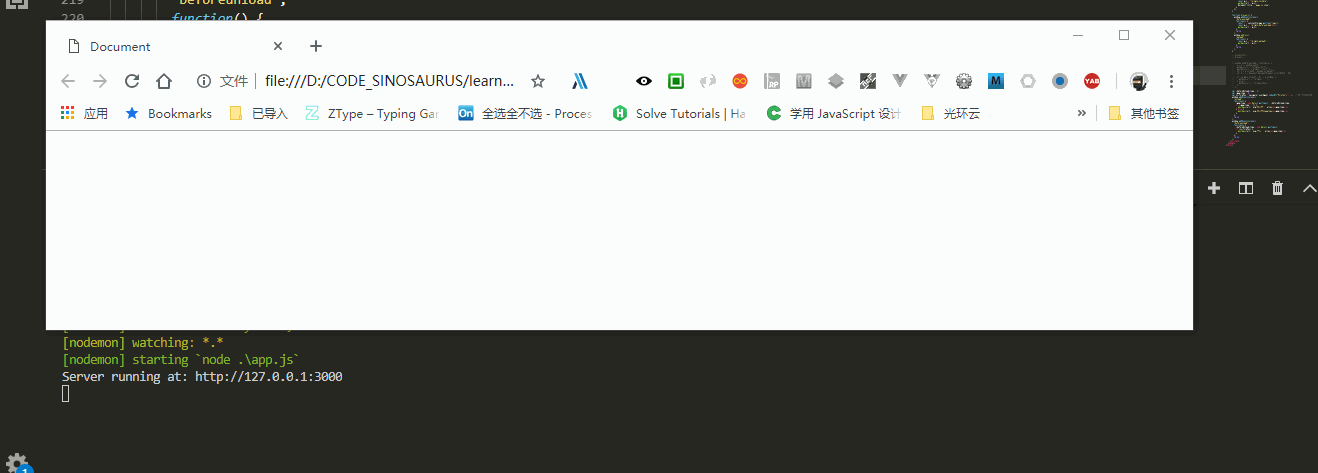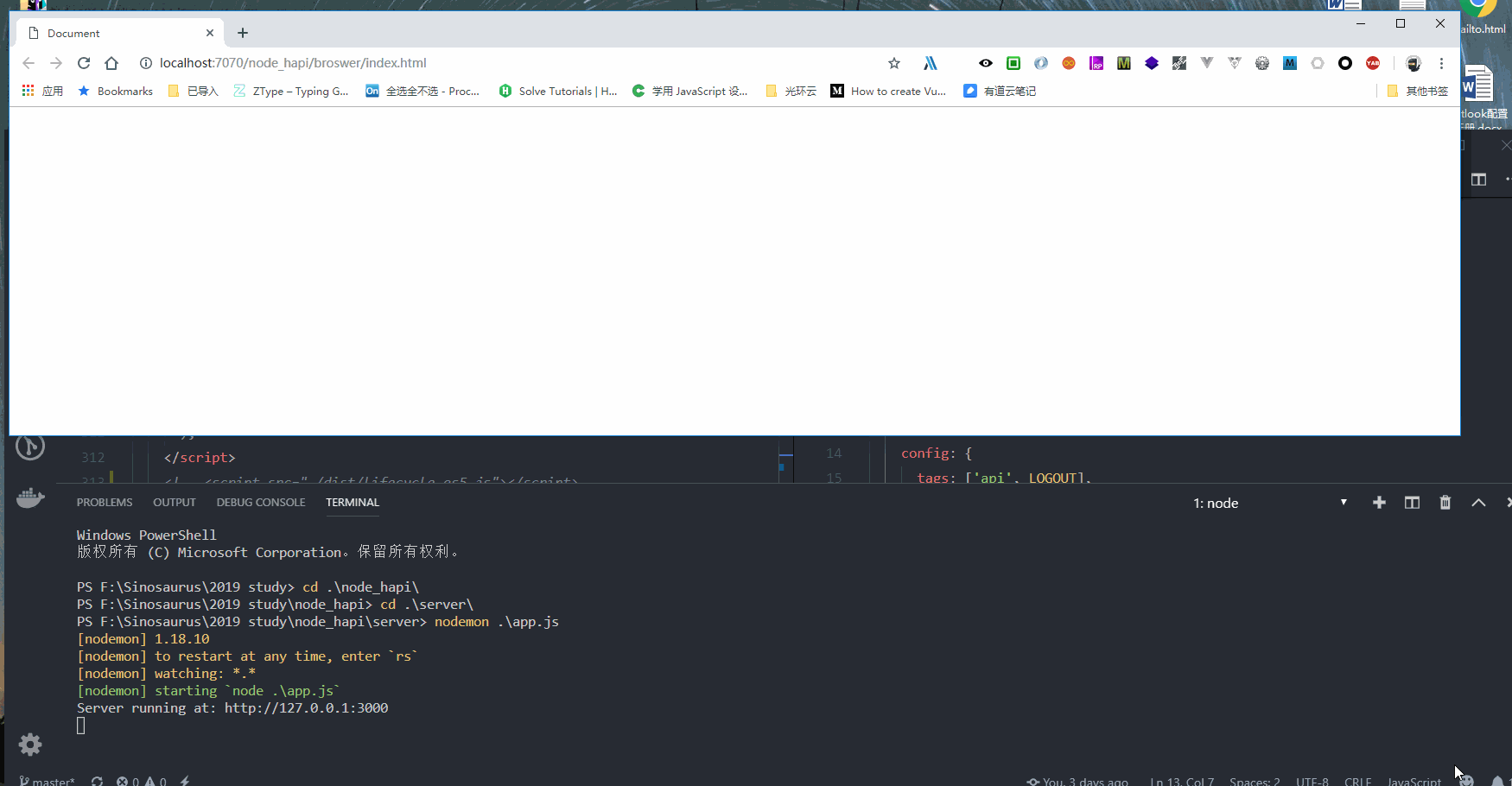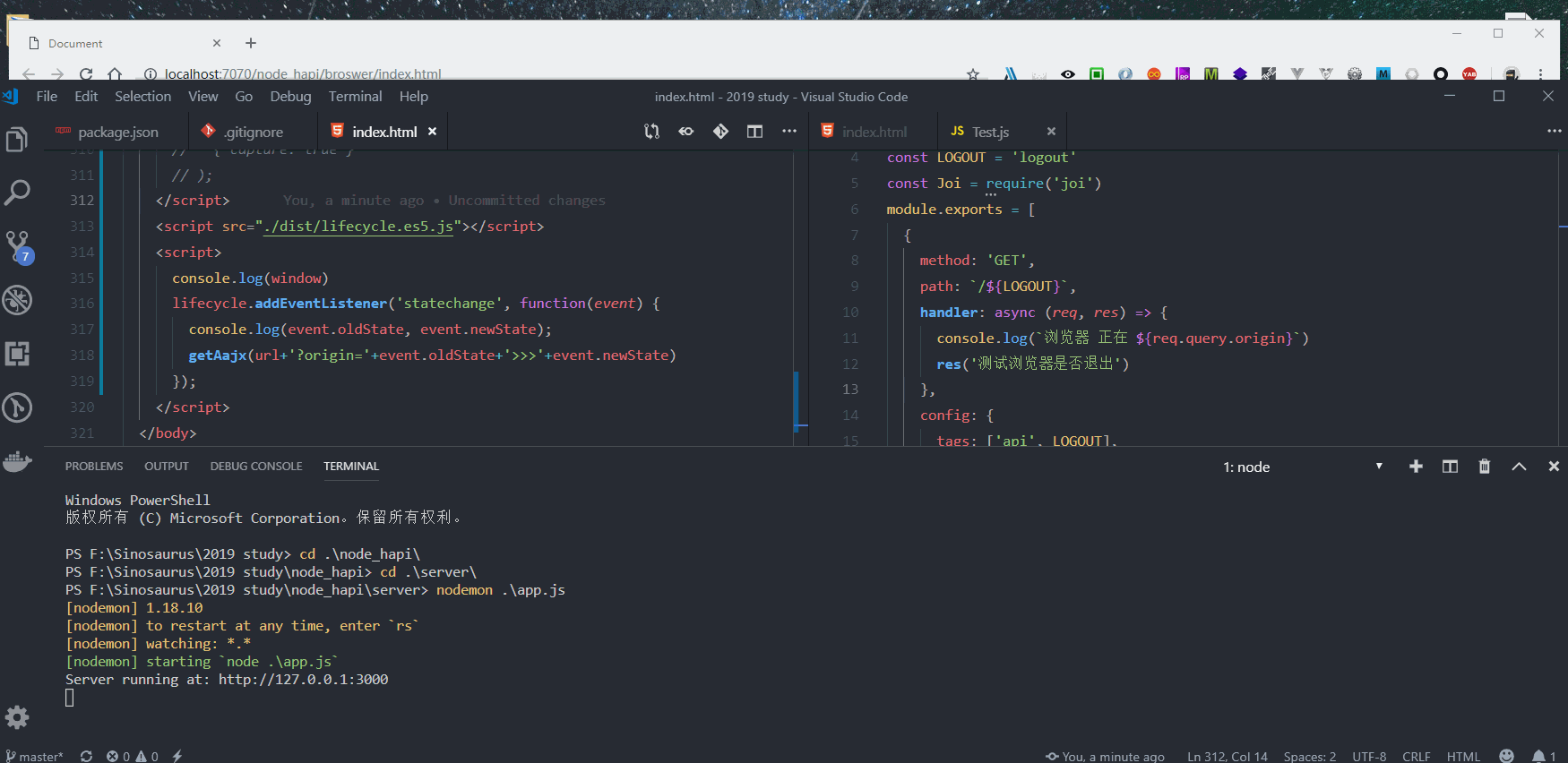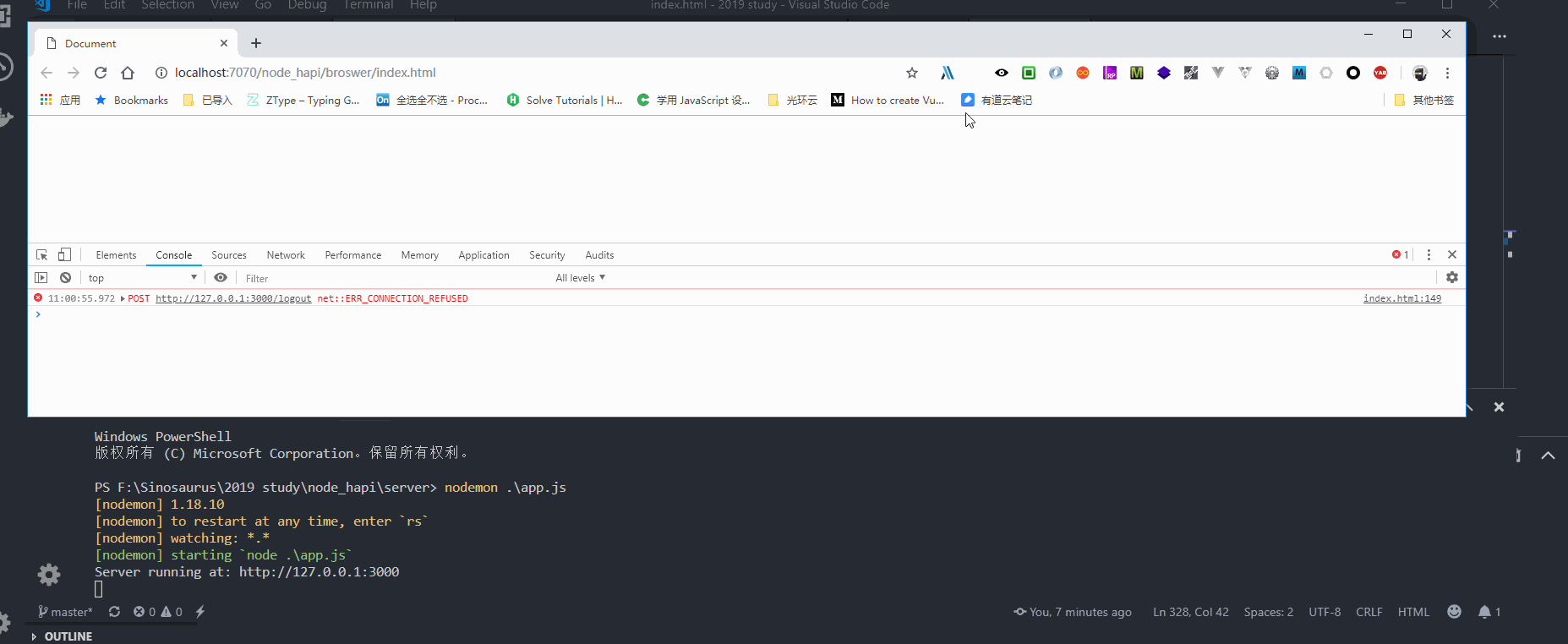如何在浏览器关闭发送请求
有的,我们需要在页面关闭时,统计用户在该网站浏览时长;有时需要告知后台,该用户已离开...
遇到这样的情况并不少见。
只是在此之前,有两件很重要的事情需要区分开来:
- 如何知道浏览器是 关闭 还是 刷新
- 关闭时发送请求,使用哪种 请求方式 才好
页面的生命周期函数
当前有两种表示方式
-
DOMContentLoaded—— 浏览器加载 HTML,并构建 DOM 树,但像和样式这样的资源可能还没有加载。
load—— 浏览器加载所有资源(图像,样式等)。beforeunload/unload—— 当用户离开页面时。
-
Page Visibility API 教程,Page Lifecycle API 教程
- Active 阶段 网页处于可见状态,且拥有输入焦点
- Passive 阶段 只可能发生在桌面同时有多个窗口的情况。
- Hidden 阶段 用户的桌面被其他窗口占据,网页不可见
- Terminated 阶段 由于用户主动关闭窗口,或者在同一个窗口前往其他页面,导致当前页面开始被浏览器卸载并从内存中清除
- Frozen 阶段 网页处于 Hidden 阶段的时间过久,用户又不关闭网页,浏览器就有可能冻结网页,使其进入 Frozen 阶段。不过,也有可能,处于可见状态的页面长时间没有操作,也会进入 Frozen 阶段
- Discarded 阶段 处于 Frozen 阶段,用户又不唤醒页面,那么就会进入 Discarded 阶段,即浏览器自动卸载网页,清除该网页的内存占用。不过,Passive 阶段的网页如果长时间没有互动,也可能直接进入 Discarded 阶段
判断浏览器是 关闭 还是 刷新
用来判断用户是否离开
通过三种方式来进行判断
beforeunload/unloadTerminated 阶段- 两者结合判断
理论知识够了,开始进行尝试
在此之前,由于页面关闭时,很多方法执行不了,只能通过连接后台进行判断,而且也很准确
var url = "http://127.0.0.1:3000/logout";
function getAajx(url) {
var client = new XMLHttpRequest();
client.open("get", url, false); // 第三个参数表明是同步的 xhr
client.setRequestHeader("Content-Type", "text/plain;charset=UTF-8");
client.send();
}
function postAajx(url, data) {
var client = new XMLHttpRequest();
client.open("post", url, false); // 第三个参数表明是同步的 xhr
client.setRequestHeader(
"Content-Type",
"application/x-www-form-urlencoded"
);
client.send(data);
}
beforeunload/unload
当浏览器窗口关闭或者刷新时,会触发beforeunload事件。当前页面不会直接关闭,可以点击确定按钮关闭或刷新,也可以取消关闭或刷新
由于刷新和关闭都会执行这个方法,因而在
beforeunload/unload中无法进行区分,下面是网友们的各种思路
- 鼠标的位置,由于需要点击关闭按钮,因而鼠标不会在窗口内
window.addEventListener('beforeunload', function () {
var n = window.event.screenX - window.screenLeft;
var b = n > document.documentElement.scrollWidth - 20;
if ((b && window.event.clientY < 0) || window.event.altKey) {
alert("是关闭而非刷新");
window.event.returnValue = ""; //这里可以放置你想做的操作代码
} else {
alert("是刷新而非关闭");
}
}, false)
可惜执行不了,主要利用关闭,刷新都会执行 onbeforeunload方法
var _beforeUnload_time = 0;
var _gap_time = 0;
var is_fireFox = navigator.userAgent.indexOf("Firefox") > -1; //是否是火狐浏览器
window.addEventListener(
"unload",
function() {
_gap_time = new Date().getTime() - _beforeUnload_time;
if (_gap_time <= 5) {
postAajx(url, `msg=浏览器关闭&time=${_gap_time}`);
} else {
postAajx(url, `msg=浏览器刷新&time=${_gap_time}`);
}
},
false
);
window.addEventListener(
"beforeunload",
function() {
_beforeUnload_time = new Date().getTime();
if (is_fireFox) {
postAajx(url, `msg=火狐关闭&time=${_gap_time}`);
}
},
false
);

可以看出,确实是可行,刷新时长都超过 5s,关闭在 5s内。基于Chrome浏览器
需要更多地去验证每个浏览器的细微差别,若是随着浏览器的不断升级,将来标准统一,有可能就没有这样的细微区别,导致执行不了
Terminated 阶段
借助Page Lifecycle API,Page Visibility API 教程,Page Lifecycle API 教程,网友
const getState = () => {
if (document.visibilityState === "hidden") {
return "hidden";
}
if (document.hasFocus()) {
return "active";
}
return "passive";
};
// Stores the initial state using the getState() function (defined above).
let state = getState();
// Accepts a next state and, if there's been a state change, logs the
// change to the console. It also updates the state value defined above.
const logStateChange = nextState => {
const prevState = state;
if (nextState !== prevState) {
console.log(`State change: ${prevState} >>> ${nextState}`);
getAajx(url+ "?origin=" + nextState);
state = nextState;
}
};
// These lifecycle events can all use the same listener to observe state
// changes (they call the getState() function to determine the next state).
["pageshow", "focus", "blur", "visibilitychange", "resume"].forEach(
type => {
window.addEventListener(type, () => logStateChange(getState()), {
capture: true
});
}
);
// The next two listeners, on the other hand, can determine the next
// state from the event itself.
window.addEventListener(
"freeze",
() => {
// In the freeze event, the next state is always frozen.
logStateChange("frozen");
},
{ capture: true }
);
window.addEventListener(
"pagehide",
event => {
if (event.persisted) {
// If the event's persisted property is true the page is about
// to enter the page navigation cache, which is also in the frozen state.
logStateChange("frozen");
} else {
// If the event's persisted property is not true the page is
// about to be unloaded.
logStateChange("terminated");
}
},
{ capture: true }
);

由于各个浏览器显示不同,上述效果不是很准确,特意使用 PageLifecycle.js再重新梳理一遍
<script src="./dist/lifecycle.es5.js"></script>
<script>
console.log(window)
lifecycle.addEventListener('statechange', function(event) {
console.log(event.oldState, event.newState);
getAajx(url+'?origin='+event.oldState+'>>>'+event.newState)
});
</script>

很遗憾,刷新跟关闭一样,依旧无法判断出来。
综上: 目前真的只能靠 方案一:beforeunload/unload 时间来进行判断了
使用什么方式进行请求
img动态创建img 利用src属性进行通知,同理script的src应该也可以XMLHttpRequest同步发送ajax请求(上述例子便是如此操作)navigator.sendBeacon()sendBeacon 这个方法主要用于满足统计和诊断代码的需要,这些代码通常尝试在卸载(unload)文档之前向web服务器发送数据
// 兼容性
navigator.sendBeacon = navigator.sendBeacon || new Function('var r = new XMLHttpRequest();r.open("POST",arguments[0],true);r.send(arguments[1]);');
function postForm (url, data) {
let P = new FormData()
P.append('origin', data.origin)
navigator.sendBeacon(url, P)
}
lifecycle.addEventListener('statechange', function(event) {
// getAajx(url+'?origin='+event.oldState+'>>>'+event.newState)
postForm(url, {origin: event.oldState+'>>>'+event.newState })
});

也是可以发送请求的,由于异步,所以跟同步的ajax不同,但是这个确实更合理
总结
- 浏览器刷新 关闭 目前只能通过时间大小来判断了,不完美
- 发送请求
navigator.sendBeacon这个会更好